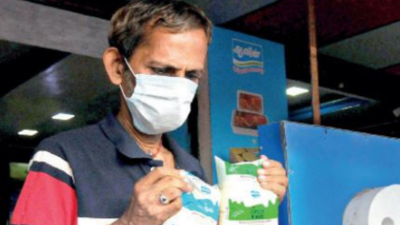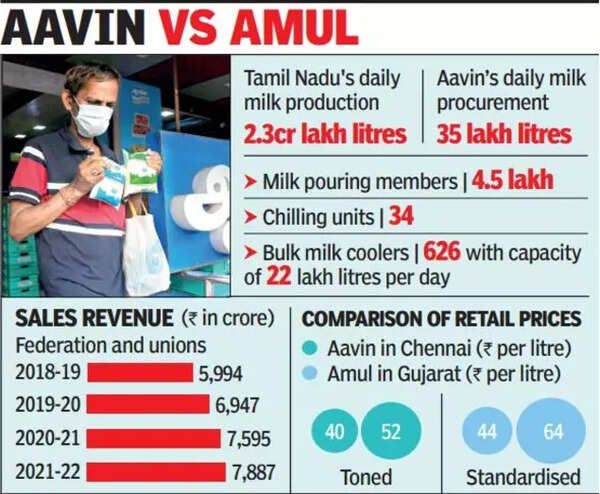- News
- City News
- chennai News
- Tamil Nadu: Amul's entry puts pressure on Aavin
Trending Topics
Tamil Nadu: Amul's entry puts pressure on Aavin

Now if Amul enters this market, more dairy farmers may ditch Aavin
CHENNAI: Chief minister M K Stalin does not want Amul to buy milk in Tamil Nadu. But the state's own milk cooperative Aavin buys only 30 lakh to 35 lakh litres a day of the 2.3 crore litres produced in the state. And its present infrastructure can handle only 45 lakh litres a day.

Aavin's daily procurement level has dropped of late because thousands of dairy farmers prefer to sell to private dairies who pay them 6 to 12 more per litre. M G Rajendran of the Milk Producers' Welfare Association said that for years they had been urging Aavin to buy milk at the rate the private dairies do.
Now if Amul enters this market, more dairy farmers may ditch Aavin. "Instead of constructing more plants to cool and process milk for sale, Aavin has in the last ten years invested more on creating more administrative divisions called unions. This added to the financial burden (salaries for new employees, constructing new buildings etc)," said S A Ponnusamy from the TN Milk Dealers' Welfare Association.
Aavin currently has only 600-odd bulk milk coolers. Ideally raw milk from cooperative societies should reach cooling centres within one hour. But in TN, it takes three hours or more. Long exposure to atmospheric conditions leads to increase in bacterial count and affects quality, says Aavin's internal audit report which recommended installation of more coolers.
Rajendran said that in the early 1970s, cooperative societies here replicated the Amul model and achieved reasonable success. "Fifty years down the line, we are worried about competing with the same Amul, which might not only offer better procurement rates, but also has a better supply chain," he said.
Though Amul milk's cover price is higher than Aavin's, it is still lower than that of private dairies in Chennai. So, more consumers might migrate towards Amul.
Speaking to TOI, Mano Thangaraj, the new state dairy development minister, said, "We will deal with the situation as we have planned to increase our daily milk handling capacity up to 70 lakh litres by this year-end by constructing more plants and creating all other necessary infra".
In the last two weeks, several issues pertaining to salaries, leakages, delays and shortage in retail markets have been addressed. By this year's end, there will be no compromise on quality too, the minister said.

Aavin's daily procurement level has dropped of late because thousands of dairy farmers prefer to sell to private dairies who pay them 6 to 12 more per litre. M G Rajendran of the Milk Producers' Welfare Association said that for years they had been urging Aavin to buy milk at the rate the private dairies do.
Now if Amul enters this market, more dairy farmers may ditch Aavin. "Instead of constructing more plants to cool and process milk for sale, Aavin has in the last ten years invested more on creating more administrative divisions called unions. This added to the financial burden (salaries for new employees, constructing new buildings etc)," said S A Ponnusamy from the TN Milk Dealers' Welfare Association.
Aavin currently has only 600-odd bulk milk coolers. Ideally raw milk from cooperative societies should reach cooling centres within one hour. But in TN, it takes three hours or more. Long exposure to atmospheric conditions leads to increase in bacterial count and affects quality, says Aavin's internal audit report which recommended installation of more coolers.
Rajendran said that in the early 1970s, cooperative societies here replicated the Amul model and achieved reasonable success. "Fifty years down the line, we are worried about competing with the same Amul, which might not only offer better procurement rates, but also has a better supply chain," he said.
Though Amul milk's cover price is higher than Aavin's, it is still lower than that of private dairies in Chennai. So, more consumers might migrate towards Amul.
Speaking to TOI, Mano Thangaraj, the new state dairy development minister, said, "We will deal with the situation as we have planned to increase our daily milk handling capacity up to 70 lakh litres by this year-end by constructing more plants and creating all other necessary infra".
In the last two weeks, several issues pertaining to salaries, leakages, delays and shortage in retail markets have been addressed. By this year's end, there will be no compromise on quality too, the minister said.
Start a Conversation
FOLLOW US ON SOCIAL MEDIA
FacebookTwitterInstagramKOO APPYOUTUBE







